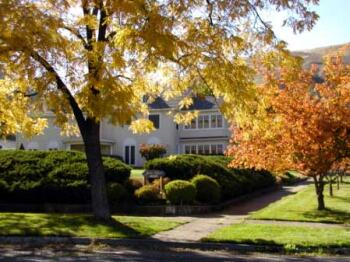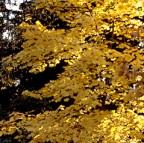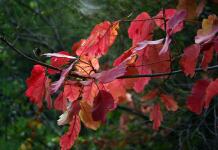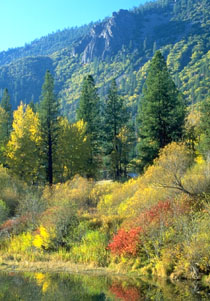
Publisher:
Bonnie King
CONTACT:
Newsroom@Salem-news.com
Advertising:
Adsales@Salem-news.com

~Truth~
~Justice~
~Peace~
TJP
Oct-07-2006 15:05

 TweetFollow @OregonNews
TweetFollow @OregonNews
Now is a Great Time to Enjoy Oregon's Fall Colors
Salem-News.comUnlike New England or other regions around the nation that have influxes of tourists coming to see the leaves turn, Oregon's fall foliage is not as well known. Except, of course, among Oregonians.
 Photos: noa.gov, stangmanor.com, volcaniclegacybyway.org |
(SALEM ) - Right now, as the days shorten and the nights grow cooler, Oregon's rural and urban forests are taking on an amazing transformation.
 Big Leaf Maple |
Oregon's rural forests are primarily composed of coniferous or "evergreen" trees, but they do show some color. The trees in our cities, our urban forests, are usually home to more deciduous trees that we associate with fall color.
Where are some good places to take in the sights of the season?
Good fall color can often be found in city parks or in arboretums, and a scenic drive is often a good way to observe fall colors. In the northern part of the state, Oregon's Historic Columbia River Highway is a great place to see fall colors. Every twist and turn in the road offers another perspective of nature, or another opportunity for a good photograph.
Aufderheide Memorial Drive in Lane County is another popular destination for viewing fall colors. Formerly called Forest Road 19 and sometimes called the "Box Canyon Road", Aufderheide Drive is a popular 145-mile loop from the Eugene-Springfield area. It can be accessed by traveling the McKenzie Highway (Hwy. 126) to a point 3.5 miles above Blue River, or by traveling Highway 58 and then turning north to Westfir.
 Poison Oak |
This time of year often generates questions from adults and children alike; questions such as "Why do leaves change color?" and, "How can I get that color in my yard?". Urban Forester Paul Ries with the Oregon Department of Forestry has answers to both questions.
 "The leaves of deciduous trees change color each fall due to a combination of environmental factors," says Ries. "During the summer months, a leaf is green because of the tree is making chlorophyll through the process of photosynthesis." Ries says that as day length wanes in the fall and temperatures cool, photosynthesis begins to shut down, revealing "the natural color pigments of the leaves" - what we know as fall colors.
"The leaves of deciduous trees change color each fall due to a combination of environmental factors," says Ries. "During the summer months, a leaf is green because of the tree is making chlorophyll through the process of photosynthesis." Ries says that as day length wanes in the fall and temperatures cool, photosynthesis begins to shut down, revealing "the natural color pigments of the leaves" - what we know as fall colors.
Weather can enhance or subdue the visual experience. Frosts, freezes, rain and excessively cloudy days make for less vivid colors. Cool, dry and bright sunny days make for the best colors. The seasonal sweep of leaf change begins at higher elevations first, and, tree health also plays a role, i.e., healthy trees will display brighter colors than unhealthy ones.
Homeowners interested in creating fall colors by planting selected hardwood or deciduous tree species might like to try planting any of the following:
Reds: oaks (especially scarlet oak), sweetgum, black gum or tupelo, dogwood
Purples: sweetgum, autumn purple ash
Oranges: sugar maple (also turns red), sassafras, vine maple
Yellows: some maples and ashes, honeylocust, yellow poplar, birches, ginkgo
Articles for October 6, 2006 | Articles for October 7, 2006 | Articles for October 8, 2006





Quick Links
DINING
Willamette UniversityGoudy Commons Cafe
Dine on the Queen
Willamette Queen Sternwheeler
MUST SEE SALEM
Oregon Capitol ToursCapitol History Gateway
Willamette River Ride
Willamette Queen Sternwheeler
Historic Home Tours:
Deepwood Museum
The Bush House
Gaiety Hollow Garden
AUCTIONS - APPRAISALS
Auction Masters & AppraisalsCONSTRUCTION SERVICES
Roofing and ContractingSheridan, Ore.
ONLINE SHOPPING
Special Occasion DressesAdvertise with Salem-News
Contact:AdSales@Salem-News.com
Terms of Service | Privacy Policy
All comments and messages are approved by people and self promotional links or unacceptable comments are denied.
judy October 27, 2006 8:57 pm (Pacific time)
would be nice to have a printable driving map
[Return to Top]©2025 Salem-News.com. All opinions expressed in this article are those of the author and do not necessarily reflect those of Salem-News.com.